|
|
|
Sort Order |
|
|
|
Items / Page
|
|
|
|
|
|
|
| Srl | Item |
| 1 |
ID:
131389


|
|
|
|
|
| Publication |
2014.
|
| Summary/Abstract |
Under what conditions do regional security organizations (RSOs) take up a broader agenda or scope in security governance? Further, does broader scope matter for regional security? These questions are addressed using a quantitative comparative analysis of 25 RSOs over the period 1990-2009. Similarity among members in their capacities and political systems are identified as two central conditions for increased scope. In contrast, hegemony is not a significant factor. Institutionalization also seems to matter: RSOs that have been around longer and encompass more members are more successful in expanding their security agenda. There is only weak empirical support for the idea that RSOs with a broader scope have a stronger pacifying effect on regional security. The implications of these findings are discussed in greater detail for Asian RSOs, which have only limited scope and operate in comparatively high levels of insecurity. However, except from the legacy of conflict, variables identified in the general models apply similarly to Asia.
|
|
|
|
|
|
|
|
|
|
|
|
|
|
|
|
| 2 |
ID:
131386
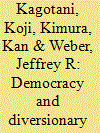

|
|
|
|
|
| Publication |
2014.
|
| Summary/Abstract |
Since its democratization, South Korea's foreign relations with Japan have become increasingly volatile. We investigate the diversionary incentives behind these fluctuations in South Korean foreign policy during 1988-2011. We show evidence that, similar to mature democracies, economic turmoil is driving Korean leaders to divert the public attention toward low-intensity disputes against Japan. However, unlike mature democracies, our results reveal that public approval ratings and national elections do not encourage leaders to engage in the diversionary behavior due to South Korean domestic political institutional settings and party system. These findings highlight challenges to foreign policy making in a new democracy, an issue that has not been considered in detail in the literature. We conclude that although historical antagonism and US commitment to East Asia may affect the Japan-South Korea relationship, economic diversionary incentives significantly determine the fluctuations in Japan-South Korea disputes.
|
|
|
|
|
|
|
|
|
|
|
|
|
|
|
|
| 3 |
ID:
131387
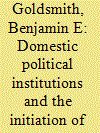

|
|
|
|
|
| Publication |
2014.
|
| Summary/Abstract |
There is doubt about whether the 'democratic peace' proposition applies in Asia. I theoretically deconstruct regime type into institutional components including political competition, constraint on the executive, and mass participation, and ask whether taking these as distinct causal factors gives more empirical purchase on the relationship of domestic political institutions to states' external conflict behavior. I find that higher levels of political competition are associated with a lower likelihood of conflict initiation, but only when the potential target is relatively democratic. Thus, my directed-dyad analysis is consistent with a democratic peace effect in East Asia. It is also suggestive regarding the observed 'East Asian peace' that has existed since 1979, because levels of political competition have risen considerably in the region, beginning in the late 1970s.
|
|
|
|
|
|
|
|
|
|
|
|
|
|
|
|
| 4 |
ID:
131391


|
|
|
|
|
| Publication |
2014.
|
| Summary/Abstract |
East Asia now occupies a prominent place in the study of international relations (IR). This, of course, does not mean that IR scholarship in the past failed to pay due attention to East Asia. Wars, trade, and international integration in this region have been the subject of analysis in countless books and scholarly articles. However, the renewed interest in this region is not so much empirically driven (to increase East Asian coverage in the literature) as before but rather represents a theoretical inquiry pertinent to the intellectual underpinning of the scholarship itself. Today, some experts of the region harshly criticize the 'euro-centric' bias of existing IR study and seek to provide alternative conceptions based on the East Asian experience.1 In response, other scholars have advanced views less provocative but more nuanced about the originality of East Asia. And, there are still others who flatly reject the connotation that the logic of East Asian international relations is inherently different from that elsewhere. Thus, a diverse set of perspectives has been laid out on the table, but their strengths and shortcomings are yet to be evaluated systematically.
|
|
|
|
|
|
|
|
|
|
|
|
|
|
|
|
| 5 |
ID:
131388
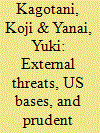

|
|
|
|
|
| Publication |
2014.
|
| Summary/Abstract |
A number of US overseas bases were deployed around the world to protect allies and maintain regional peace. Some bases have been stationed in the partner countries for the long term, whereas others were withdrawn from their partners' territories in the face of strong local opposition. Understanding local support for US overseas bases is indispensable for managing alliance politics and pursuing US grand strategy. This article addresses the 1972-2006 Okinawa gubernatorial elections where the US base issue had been chronically politicized and locals supported pro-base candidates six out of ten times contrary to their anti-base preferences. This article addresses external threats as a determinant of vote choice. We analyze the gubernatorial elections as the opportunities for Okinawans to convey their support for or opposition to the current national security policy since US bases in Okinawa are critical to Japan's security. We find that external threats do encourage Okinawans to support pro-base candidates, but the effect of perceived security-related risks is moderate. Moreover, physical and psychological costs such as airplane crashes, environmental and noise pollution, and rape incidents have larger influence on the election outcomes rather than material benefits such as the fiscal transfers and base-related subsidies, which is contrary to the conventional view.
|
|
|
|
|
|
|
|
|
|
|
|
|
|
|
|
| 6 |
ID:
131384
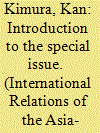

|
|
|
|
|
| Publication |
2014.
|
| Summary/Abstract |
In recent years, East Asian countries have faced serious challenges with regard to regional security. The bilateral relationships between China and Japan, and Japan and South Korea, have become increasingly strained due to a variety of disagreements over key political issues, such as territorial claims. Some observers argue that China and Japan may become involved in a direct military confrontation in the near future over the Senkaku/Diaoyu Islands. The increasing levels of naval and aerial engagements between the two countries demonstrate that such arguments can no longer be seen as 'out of the question'. While two democracies in the region, Japan and South Korea, are both major alliance partners with the United States and share the key security concern of countering North Korea's nuclear and conventional provocations, the two have suffered deteriorating relations since 2012. For instance, the General Security of Military Information Agreement, which provided a mechanism through which Japan and South Korea could share military technology, was canceled in July 2012. Furthermore, the two states have been embroiled in an increasingly antagonistic territorial dispute over Takeshima/Dokdo Islands since President Lee Myung-bak's visit to the islands in August 2012.
|
|
|
|
|
|
|
|
|
|
|
|
|
|
|
|
| 7 |
ID:
131390
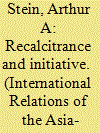

|
|
|
|
|
| Publication |
2014.
|
| Summary/Abstract |
This paper challenges the conventional wisdom that US power and preferences following World War II led to bilateralism in Asia and multilateralism in Western Europe. It argues that the challenges facing the United States in both regions were similar, as were US policies meant to address them. With some lag, the United States supported the economic recovery of the regional powers it had defeated (Germany and Japan), saw the restoration of regional trade as a prerequisite, sought military bases to assure postwar security, and envisioned rearming its former foes as part of its security strategy. The outcomes in the two regions reflected the preferences and reservations of regional actors. The critical differences between the regions were structural. The existence of middle powers was critical in Europe, the return of colonial powers to Asia precluded regional arrangements in the short term, and geostrategic differences shaped the requisites for regional security.
|
|
|
|
|
|
|
|
|
|
|
|
|
|
|
|
| 8 |
ID:
131385
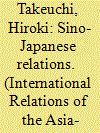

|
|
|
|
|
| Publication |
2014.
|
| Summary/Abstract |
China and Japan have been deepening economic interdependence over the last two decades, while China has recently shown territorial ambitions and initiated disputes with Japan. This runs contrary to the commercial liberal literature that argues that trade promotes peace. On the other hand, the realist theory also does not fully explain Sino-Japanese relations because Sino-Japanese relations are not always in conflict. The rise of China and the relative decline of Japan might explain increasing tensions in the rivalry relationship, but what drives Chinese leaders to initiate disputes? I address the importance of domestic politics to examine Sino-Japanese disputes. I argue that the recent deterioration of the bilateral relationship could be explained by the power struggle in the Chinese leadership. To support the logic of this argument, I use a game-theoretic model, which accounts for how the type of Chinese leadership influences foreign policy outcomes in Sino-Japanese relations.
|
|
|
|
|
|
|
|
|
|
|
|
|
|
|
|
|
|
|
|
|